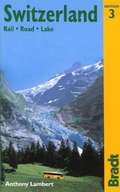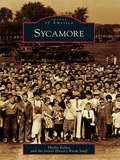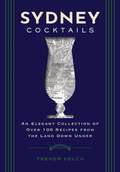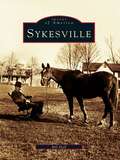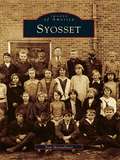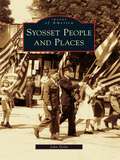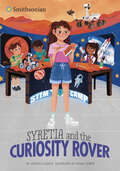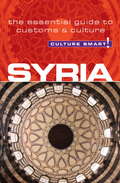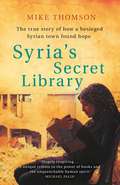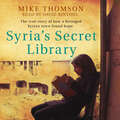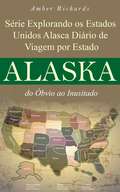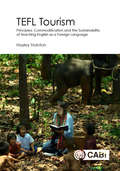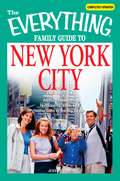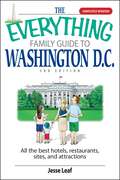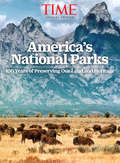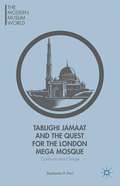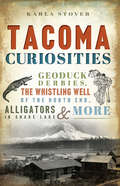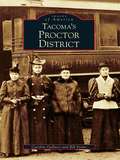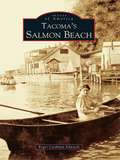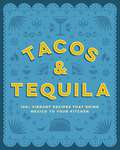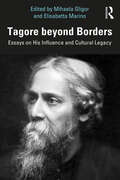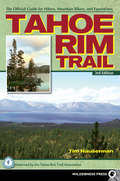- Table View
- List View
Switzerland: Rail, Road, Lake (3rd edition)
by Anthony J. LambertGeneral info about Switzerland, and a guide to its rail network, lake steamers, cycle routes, restaurants and hotels near stations, and walking tours of its major cities
Sycamore
by Phyllis Kelley Joiner History Room StaffThe attractions of Sycamore include its majestic 1904 county courthouse, domed Carnegie library, well-appointed Victorian homes and tree-lined streets, and flourishing central business district located on a broad main street first laid out in the mid-19th century. The 1¢ parking meters are a nice touch too. This DeKalb County seat retains the charming appearance of a fictional midwestern "small-town USA." Now known far and wide for its annual pumpkinfestival in October, Sycamore has a rich historical past. In Sycamore, readers will discover people, businesses, organizations, and events that contributed to this community becoming a place where the slogan "Life Offers More in Sycamore" was a natural.
Sydney
by Jan MorrisIn "Sydney", Jan Morris, one of the great historians and travelers of our time, penetrates the mysteries and complexities of this seductive city as only she can. Built upon a penal colony, its first citizens British criminals and wardens, "Sydney" is a city that bears the mark of its hard-knocks history. Morris brilliantly weaves the past out of the present, finding ghosts of the city's rebellious founders in the vibrancy and pluck of today's populace. Imagine a mix of brashness and worldly chic, good humor and jealousy, calm and aggression. Such is "Sydney", a wealth of contradiction. One thing is clear, though, and incontrovertible: Here is one of the most visually stunning cities in the world.
Sydney Cocktails: An Elegant Collection of Over 100 Recipes Inspired by the Land Down Under (City Cocktails)
by Trevor FelchSydney Cocktails is an elegant collection of over 100 recipes inspired by the land down under.These signature drink recipes from Sydney hotspots pay homage to the flavor capital of Australia. With over 100 recipes and dozens of bartender profiles, you can drink like a local whether you&’re just visiting or entertaining at home. From Polynesian tiki bars to 70s-inspired retro lounges,locals and tourists alike will discover new watering holes that are sure to satisfy all tastes. With the best signature creations by prominent mixologists in the area, this book offers a detailed rundown of the best locations Sydney has to offer.Within the gorgeous, die-cut covers, you'll find: More than 100 essential and exciting cocktail recipes, including recipes for bespoke ingredients and other serving suggestionsInterviews with the city&’s trendsetting bartenders and mixologistsBartending tips and techniques from the experts - Food and drink hotspots across the cityAnd much more!Golden beaches, aqua seas, glamorous nightlife--nowhere does it quite like Sydney. Enjoy this multicultural craft cocktail scene without ever leaving your zip code with Sydney Cocktails.
Sykesville
by Bill HallA picturesque, little town located along the banks of the rolling Patapsco River, Sykesville, Maryland has had a long and distinctive history. Though not officially incorporated until 1904, Sykesville was first put on the map when, in 1831, the mighty Baltimore and Ohio Railroad sent its "Old Main Line" from the thriving metropolis of Baltimore to Point of Rocks in Frederick County, Maryland and traveled through the small town of Sykesville on its route. After that, tourism became an important industry in the town, as well-to-do Baltimoreans searched for a country refuge during the hot summer months. Sykesville, located in Carroll County and just 30 miles from Baltimore city, was the perfect spot to enjoy a relaxed and shady holiday.As Sykesville grew and changed over the years, many individuals, including Suzannah Warfield, Frank Brown, Wade Warfield, J.H. Fowble, E. Francis Baldwin, and Edwin Mellor, played important roles in the town's commercial development. But it is Sykesville's unique heritage, the great value placed on preserving that past by residents, and the resilient character of the community that has made Sykesville what it is today. Following a decline in the 1970s, the town experienced a rebirth fostered by the tenacious spirit of local officials and residents who strongly believed that the town could regain its past glory. Now, as one strolls along Sykesville's downtown streets, the past seems once again alive and the community's singular story is at the heart of it all.
Syosset (Images of America)
by Tom MontalbanoA bustling suburb that hosts a wide array of businesses and retail shops, a top-rated school system, and a largely affluent, ethnically diverse population, Syosset has become one of Long Island's most desirable places to live. Yet, as the years have passed, much of the community's early history has been lost. Syosset uses rare photographs, diaries, historical documents, and interviews to uncover fascinating information about the Syosset-Woodbury area's past, from its humble beginning in 1648 to its transformation into a booming residential suburb in the 1950s. For example, did you know that Native Americans once hunted in the area of Humphrey Drive or that the British army had an encampment in Syosset during the American Revolution? Can you guess when the Long Island Rail Road first chugged through Syosset? (Hint: Soldiers rode the train out of Syosset on their way to fight in the Civil War.) These and other captivating facts, including some surprising revelations about poet Walt Whitman's disastrous stint as a teacher in Woodbury, the presence of the Ku Klux Klan in Syosset, and the eccentric behavior of some of Syosset's most colorful Gatsby-era "estatespeople," are all documented in text and rare photographs collected over more than a decade.
Syosset People and Places (Images of America)
by John DelinThe hamlet of Syosset, located on Long Island's North Shore, was settled by the Dutch and English in 1648 and was known as Eastwoods. It was not until 1854, when the Long Island Rail Road named its new stop, that the hamlet was given the name Syosset. The presence of the railroad led to a continued population expansion as local farmers prospered and newcomers discovered and joined the desirable community. By the last half of the 20th century, the excellence of Syosset's schools drew new residents eager to raise their children around a solid education. Through rare photographs and postcards, Syosset People and Places presents the residents, homes, businesses, and schools that have shaped this historic community.
Syretia and the Curiosity Rover (Smithsonian Historical Fiction)
by Ailynn CollinsSoon after moving to California, Syretia’s mom enrolls her and her brother, Sean, in a Mars or Bust summer camp. Stung by the recent move—and unimpressed by the camp’s focus on the upcoming landing of the Mars Curiosity Rover—Syretia can’t bring herself to care. Until, that is, she discovers that she has more in common with the Mars rover and its mission than she could ever imagine. Can Curiosity’s landing a world away open Syretia’s heart and mind to her new life here on Earth?
Syria - Culture Smart!
by Sarah StandishAfter years of diplomatic isolation Syria is emerging from the cold. Its government is a key Middle Eastern player, and will be a major element of any possible comprehensive Middle Eastern peace deal. To visit Syria is to become acquainted with one of the most rewarding destinations in the Middle East. Its historic attractions are stunning, and the Syrians are proud and gracious hosts; you can expect to be treated like a person and not just a tourist. Of course, there are always thorns with the roses: Syria's economy is inefficient, and its youth are frustrated; the strong-man political system that has held the country together does not encourage public intellectual life, but nor does it prevent young Syrians from debating with passion in private. The Syrian sense of tradition has preserved some of the bad along with the good, and society remains highly patriarchal. Despite such drawbacks, this is a country that's rich not only in resources, but also, and especially, in its people. American author Sarah Standish looks at Syria's long history and its present-day political realities. She describes the many subgroups that make up the population as well as what unites all Syrians. She offers practical tips for traveling and on what to expect when conducting business. You'll learn how people communicate with each other, and how you can communicate with them. The Syrians will never stop surprising you: get to know a few, and they will turn the stereotypes inside out several times over.
Syria's Secret Library: The true story of how a besieged Syrian town found hope
by Mike Thomson'Hugely inspiring . . . A unique tribute to the power of books and the unquenchable human spirit' MICHAEL PALIN'An inspiring read - humanity at its best' DAVID NOTT, author of War DoctorDaraya lies on the fringe of Damascus, just south west of the Syrian Capital. Besieged by government forces since 2011, its people were deprived of food, bombarded by bombs and missiles, and shot at by snipers. But while the streets above echoed with rifle fire, deep beneath lay a secret library - a haven of peace with books lining almost every wall. Many people had risked their lives to save these precious titles from the devastation of war. Because to them, the secret library was a symbol of hope - of their belief that books would triumph over bombs and help them rebuild their fractured society. This is the true story of an extraordinary place and the people who made it happen.
Syria's Secret Library: The true story of how a besieged Syrian town found hope
by Mike Thomson'Hugely inspiring . . . A unique tribute to the power of books and the unquenchable human spirit' MICHAEL PALIN'An inspiring read - humanity at its best' DAVID NOTT, author of War DoctorDaraya lies on the fringe of Damascus, just south west of the Syrian Capital. Besieged by government forces since 2011, its people were deprived of food, bombarded by bombs and missiles, and shot at by snipers. But while the streets above echoed with rifle fire, deep beneath lay a secret library - a haven of peace with books lining almost every wall. Many people had risked their lives to save these precious titles from the devastation of war. Because to them, the secret library was a symbol of hope - of their belief that books would triumph over bombs and help them rebuild their fractured society. This is the true story of an extraordinary place and the people who made it happen.(p) Orion Publishing Group 2018
Série Explorando os Estados Unidos Alasca - Diário de Viagem por Estado: do Óbvio ao Inusitado
by Amber Richards Débora GastalNesta série, vamos explorar um estado americano de cada vez. Neste ebook, você irá conhecer o lindo estado do Alasca. Seja você residente no Alasca ou alguém que planeja visitá-lo, nós vamos lhe mostrar lugares legais para se visitar e coisas interessantes para se fazer. Algumas destas sugestões serão sobre opções já conhecidas e populares, enquanto outras serão sobre lugares inusitados e fora do circuito turístico habitual. Este guia foi escrito com a colaboração de uma pessoa residente no Alasca, para oferecer uma perspectiva local. Muitas vezes, isso nos permite oferecer uma visão completamente diferente da região, diversa daquela trazida pelos guias de viagem. O enfoque desta série não é tanto em onde se hospedar e comer (a menos que isso ofereça uma experiência verdadeiramente única da região), mas nas cidades, na vida local, na natureza e na paisagem, em um pouco de história e também em coisas para se fazer enquanto você estiver no Alasca. Há também capítulos sobre cidades fantasma, feiras e festivais populares e passeios legais para famílias.
TEFL Tourism: Principles, Commodification and the Sustainability of Teaching English as a Foreign Language
by Hayley StaintonThere is evident lineage between the concepts of teaching English as a foreign language (TEFL) and tourism, represented through evocative marketing material, the commoditisation of the TEFL product, teacher motivations and experiences. Yet, to date there has been no recognition of these links within industry or academia. This book introduces the concept of 'TEFL tourism', outlining the scale of the sector and the rapid commercialization of TEFL teaching across the world, locating it as an emerging form of niche tourism. The text outlines the organisation types and geographical locations, emphasizing the commodification of English language teaching. It also outlines the types of TEFL tourists, the complexities of international education, links with various tourism forms and sustainability considerations of the industry. Key features include: - The first book of its kind - Case studies throughout add context to the theoretical presentation of the industry - Presents relevant industry statistics - Addresses sustainability and stakeholders. The book will appeal to tourism academics and students, in particular those with interests in educational and volunteer tourism as well as sustainable tourism and commodification.
THE EVERYTHING® FAMILY GUIDE TO NEW YORK CITY 3rd Edition
by Jesse J. LeafFive boroughs, two major league baseball teams, 12,000 yellow taxis, and more must-see attractions than you can count-New York City has it all. And The Everything Family Guide to New York City, 3rd Edition has all you need to enjoy your visit! This one-stop resource is packed full of insider tips and maps, including: Ellis Island, Statue of Liberty, Empire State Building, and other landmarks Greenwich Village, Soho, Chinatown, and additional unique neighborhoods Central Park, Times Square, and Broadway Coney Island, the Bronx Zoo, sports stadiums, sunny beaches, world-class museums-and more!You'll also find completely updated details on the best hotels, restaurants, attractions, and shopping-plus quick and easy tips for handling subways, taxis, and the city streets themselves. This comprehensive reference is the one book you and your family needs in the city that never sleeps!
THE EVERYTHING® FAMILY GUIDE TO WASHINGTON D.C. 3rd Edition
by Jesse LeafThe Everything Family Guide to Washington D.C., 3rd Edition includes all the most interesting and popular D.C. destinations. This informative and fun guide takes you from the White House and the monuments to the expansive Smithsonian and other museums, with important travel information such as: Famous landmarks and points of interest The best hotels for your money Activities for kids of all ages Where to dine-with and without the kids This completely revised and updated edition features an expanded section on special interest attractions like the African-American Civil War Memorial, the National Japanese American Memorial, the National Museum of the American Indian, the Holocaust Museum, and the National Museum of Women in the Arts. The Everything Family Guide to Washington D.C., 3rd Edition offers all your family needs to plan a trip and get the most out of it.
THE Everything Kids' Travel Activity Book
by Erik A. Hanson Jeanne K. HansonThe book that will have kids asking "Are we there already?" instead of "Are we there yet?"Packed full of puzzles, activities, and games, The Everything "RM" Kids' Travel Activity Book provides hours of entertainment for kids -- no matter how restless and fidgety -- whether they're traveling by planes, trains, or automobiles. There's cool stuff to do while the world whizzes by outside the window, like: -- Create your own postcard-- Invent a new automobile-- Sing railroad songsPlus, there's also great information about all those things kids love to know, such as: -- What makes your foot "go to sleep"?-- Why does your sister cough?-- How long can you go without blinking?-- Why do we daydream?Kids can draw caricatures, read about auto inventors, calculate mileage, take quizzes, and test their memory. At the back is information about each U. S. state. They can even keep a weather diary. The traveling fun is endless!
TIME Our National Parks at 100: 100 Years of Preserving Our Land and Heritage
by The Editors of TIMEAs the National Park Service marks its 100th birthday in 2016, TIME celebrates America's spectacular, unspoiled natural treasures. Vast in scale at nearly 85 million acres, the park system stretches from Acadia park in Maine to War in the Pacific park on Guam and more than 400 parks in between, visited by 280 million people each year. Highlights of this special edition:Jewels in the crown: a lavish pictorial tour of the most breathtaking parks, including Yosemite, Yellowstone, Grand Canyon, Glacier and Grand TetonFounding fathers: the idea of a national park began with Western painter George Catlin and was later embraced by President Teddy Roosevelt after three nights under the stars in Yosemite ValleyA visitor's guide to the best of the parks and monuments, from the spectacular to the quirky
TSA Baggage: An Inside Look at the Good, the Bad, and the Ugly at America's Airports
by Scott BeckerScott Becker spent over 12 years working for the TSA at Chicago’s O’Hare airport and served it in numerous capacities, from baggage screener to manager. He brings to TSA Baggage a wealth of experience and stories that have something for everyone:•Candid Cameos: Several stories in TSA Baggage feature appearances from celebrities, including Madeleine Albright, Patch Adams, and the Kardashians•Behind-the-Scenes Look: For anyone who’s ever wondered what happens in the parts of airports hidden from a view or during a shift at a security check, this book provides first-hand accounts of the inner workings of airports and the people who keep them humming•Laugh Track: Airports seem to attract the misguided, confused, and weird, and this provides for plenty of laughs, whether its passengers attempting to bring grenades in their luggage or trying to skip through security in a drunken tizzy•Travel Warning: This book can also be a great guide to do’s and don’ts for all future travelers, with tips from someone who’s seen everything that can go right and wrong at an airportTravel brings out the good, bad, and ugly in everyone, and TSA Baggage captures all of it for readers from a first-hand witness to the whole circus. Strap in and get ready for a great read.
Tablighi Jamaat and the Quest for the London Mega Mosque
by Zacharias P. PieriThe book charts the attempts of Islam's largest missionary movement, the Tablighi Jamaat, to build Europe's largest mosque in London. Key themes include how Islamic movements engage and adapt within liberal democracies and how local contexts are key in understanding how and why movements operate in a given way.
Tacoma Curiosities: Geoduck Derbies, the Whistling Well of the North End, Alligators in Snake Lake & More
by Karla StoverWhen the Northern Pacific Railroad laid its final tracks within the fledgling hamlet of Tacoma, it brought opportunity and wild characters by the car full. Seemingly overnight, the quiet Puget Sound village transformed into a booming metropolis and eccentric playground with its fair share of growing pains. On one unlucky evening, residents awoke to the cries of a man who fell into the sewers after a road collapsed. Tacoma's first school avoided demolition for a time thanks to a band of enterprising tramps who converted the place of learning into Hotel de Gink, complete with unique minstrel show. Local author and guide Karla Stover explores these and many more stories of the quixotic and curious history of the City of Destiny.
Tacoma's Proctor District (Images of America)
by Bill Evans Caroline GallacciWhen Allen C. Mason launched his Point Defiance line in the early 1890s, the Proctor area became one of Tacoma's first streetcar suburbs. Before this time, Tacoma's North End was a remote, unsettled region populated only by those visiting the city's horseracing track. After Mason established a streetcar stop at the intersection of North Twenty-sixth and Proctor Streets--near the racetrack--businesses began to line the thoroughfare. By 1900, houses had been constructed within walking distance of the line, and a residential neighborhood provided the impetus for the construction of schools, a firehouse, churches, and a library. By the 1920s, the neighborhood had expanded and changed to reflect the introduction of the automobile as well as the district's popularity with University of Puget Sound students studying nearby. The community spirit that emerged then continues to this day.
Tacoma's Salmon Beach
by Roger Cushman EdwardsPerched on the shores of the Tacoma Narrows, the community of Salmon Beach overlooks the spectacular Tacoma Narrows Bridge. Built as a series of fishing shacks on the beach, Salmon Beach took on a more permanentflavor after Henry O. Foss towed his two-story boathouse from the city to the tidelands south of Point Defiance. After electricity was introduced in 1934, more comfortable cottages were built in this fishing community. From summer beach camping to an isolated refuge in the middle of a city, a haven for rumrunners during Prohibition to the counterculture enclave of the 1960s, the community of Salmon Beach has weathered fires, evictions, landslides,and government caprice to become the unique neighborhood of Tacoma it is today.
Tacos and Tequila: 100+ Vibrant Recipes That Bring Mexico to Your Kitchen
by Cider Mill PressTacos aren&’t just for Tuesday. Now every night is Taco Night! Bring the vibrant flavors of Mexico to your kitchen with Tacos & Tequila.This cookbook is packed with delicious recipes that capture the spirit of Mexican cuisine. Add some flare to your next meal with soft taquitos, crisp tacos al pastor, classic carne asada, or fish tacos. Explore beloved classics and new twists as you take a journey through Mexico's colorful culinary heritage and regional specialties.Inside you'll find:60+ recipes for flavorful entrees, appetizers, and sides40+ delicious cocktails to complement your meal and get the party startedHelpful tips on the best fillings and toppingsMouthwatering photographyGrab the guacamole and mix your favorite margaritas--Tacos & Tequila is guaranteed to fill any gathering with fun, laughter, and great eats!
Tagore beyond Borders: Essays on His Influence and Cultural Legacy
by Mihaela Gligor Elisabetta MarinoThis book looks at Rabindranath Tagore’s creative art, social commitment, literary and artistic representation and his unique legacy in the cultural history of modern India – as a blend of the quintessentially Indian and the liberal universalist. Tagore’s genius, which he expressed through his poetry, songs, paintings, drama and philosophy, is celebrated across the globe. In 1913, he was awarded the Nobel Prize for Literature for his volume of poetry, Gitanjali (Song Offerings), making him the first Nobel laureate from Asia. This volume of essays celebrates his intellectual engagements and his incredible legacy by discussing the diverse ways in which his works have been reinterpreted, adapted and translated over the years. It analyses his perspectives on modernity, nationalism, liberation, education, post-colonialism and translatability and their relevance today. The leitmotif is a Tagore who, while imaginable as made possible only within the Indian tradition, eludes attempts aimed at identification with a national culture and remains a "cosmopolitan" in the best sense of the term.This volume will be of interest to readers and researchers in the fields of literature, philosophy, political science, cultural studies, Asian studies, South Asian studies and Tagore studies. Fans of Tagore will also find this an interesting read as it presents many little knows aspects of the poet’s work.
Tahoe Rim Trail
by Tim HausermanThe 165-mile Tahoe Rim Trail is considered one of the world's premier trails. Accessible by hikers, equestrians, skiers and mountain bikers (for the non-wilderness portions), it winds completely around spectacular Lake Tahoe, the highest and largest alpine lake in North America. The trail crosses through six counties, three national forests, and two states and was completed in 2001 largely by volunteer labor.The best-selling Tahoe Rim Trail has been revised to reflect the latest conditions and routing of the trail and includes information for over 20 miles of new trail. Updated topographic maps depict the entire route, along with the easy (and fun) to read trail directions, the book includes fascinating information on the plants and animals you'll see along the trail, plus essential advice for planning a hike on the TRT, whether it's a day's outing or a 2-week circuit of the entire lake.The first and only how-to guide to this popular trail, it is the official guidebook of the Tahoe Rim Trail Association, whose mission is to improve, maintain and promote the trail.
